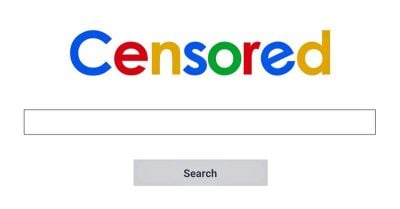‘Wow. Just Wow’: Google Censors Basic 2-Question Survey on COVID

Google denied permission to use its Google Surveys platform to publish a brief survey about people’s experiences with COVID-19 and myocarditis, according to Steve Kirsch, executive director of Vaccine Safety Research Foundation.
Google denied permission to use its Google Surveys platform to publish a brief survey about people’s experiences with COVID-19 and myocarditis, according to Steve Kirsch, executive director of Vaccine Safety Research Foundation.
Kirsch on Wednesday reported the rejection, telling readers of his Substack post:
“Clearly, they don’t want anyone to know the truth. The only truth they want you to know is what the government tells you.”
Kirsch said his team put together a two-question survey, and Google rejected both questions. Here’s what Kirsch and his team tried to ask:
1. Has anyone in your household (including yourself):
a. Had COVID
b. Is now unable to work because of a COVID infection
c. Died from COVID
2. Has anyone in your household (including yourself):
a. Had the COVID vaccine
b. Had a diagnosis of myocarditis after getting the COVID vaccine
c. Died from the COVID vaccine
“Apparently, Google won’t let you ask any questions related to … COVID or the vaccines. Wow. Just wow,” Kirsch said.
Kirsch, a tech entrepreneur, philanthropist and founder of the COVID-19 Early Treatment Fund, included a screenshot of Google Surveys’ explanation for why it wouldn’t allow their survey.
According to Google Surveys, the team’s survey questions were problematic because:
“Surveys that request information related to certain medical topics or vividly describing a certain medical topic issue are a non-starter.
“In this scenario we must reserve the right to allow or not allow surveys with these topics at our sole discretion.”
Google Surveys also said the questions must be removed because questions involving “offensive, obscene, gruesome, hocking or distasteful content” are unallowed on their platform.
Questions about COVID and myocarditis deemed ‘offensive’
Google does allow its own survey data about COVID-19 on its Google Health platform.
Google Health — whose stated mission of “helping everyone, everywhere be healthier through products and services that connect and bring meaning to health information” — touts a “COVID-19 Open Data Repository.”
According to Google Health’s website, their data repository is “one of the most comprehensive collections of up-to-date COVID-19-related information to help public health professionals, researchers, policymakers and others in analyzing, understanding, and managing the virus.”
Google says the data come “from authoritative sources, gathered automatically as well as from volunteers and contributors, and is updated daily or more frequently.”
According to the website:
“We aggregate data from hundreds of data sources to ensure global representation.
- Authoritative sources (governmental, health, universities)
- General sources (news media, publications)
- Crowdsourcing (volunteers, contributors)”
Google Health also states: “We welcome your contributions.”
According to Google, its Google Health initiative helps “researchers and scientists in advancing the science of public health” and provides “researchers with datasets and tools they can use to discover novel insights in support of public health.”
Kirsch suggested Google wouldn’t allow his team to run their survey because it questioned the official COVID-19 government narrative.
Kirsch said:
“We already know from other surveys we’ve run that the vaccines are not safe. Disallowing such surveys is a danger to society.”
“I can’t wait for the day when I hear a Google executive admit, ‘It was a mistake to censor this information and make it difficult for the public to learn the truth about how unsafe these vaccines are.’
“Will that day ever come? Probably not.”
*
Note to readers: Please click the share buttons above or below. Follow us on Instagram and Twitter and subscribe to our Telegram Channel. Feel free to repost and share widely Global Research articles.
Suzanne Burdick, Ph.D., is an independent journalist and researcher based in Fairfield, Iowa.
Featured image is from CHD
This article has been archived for your research. The original version from Global Research can be found here.


